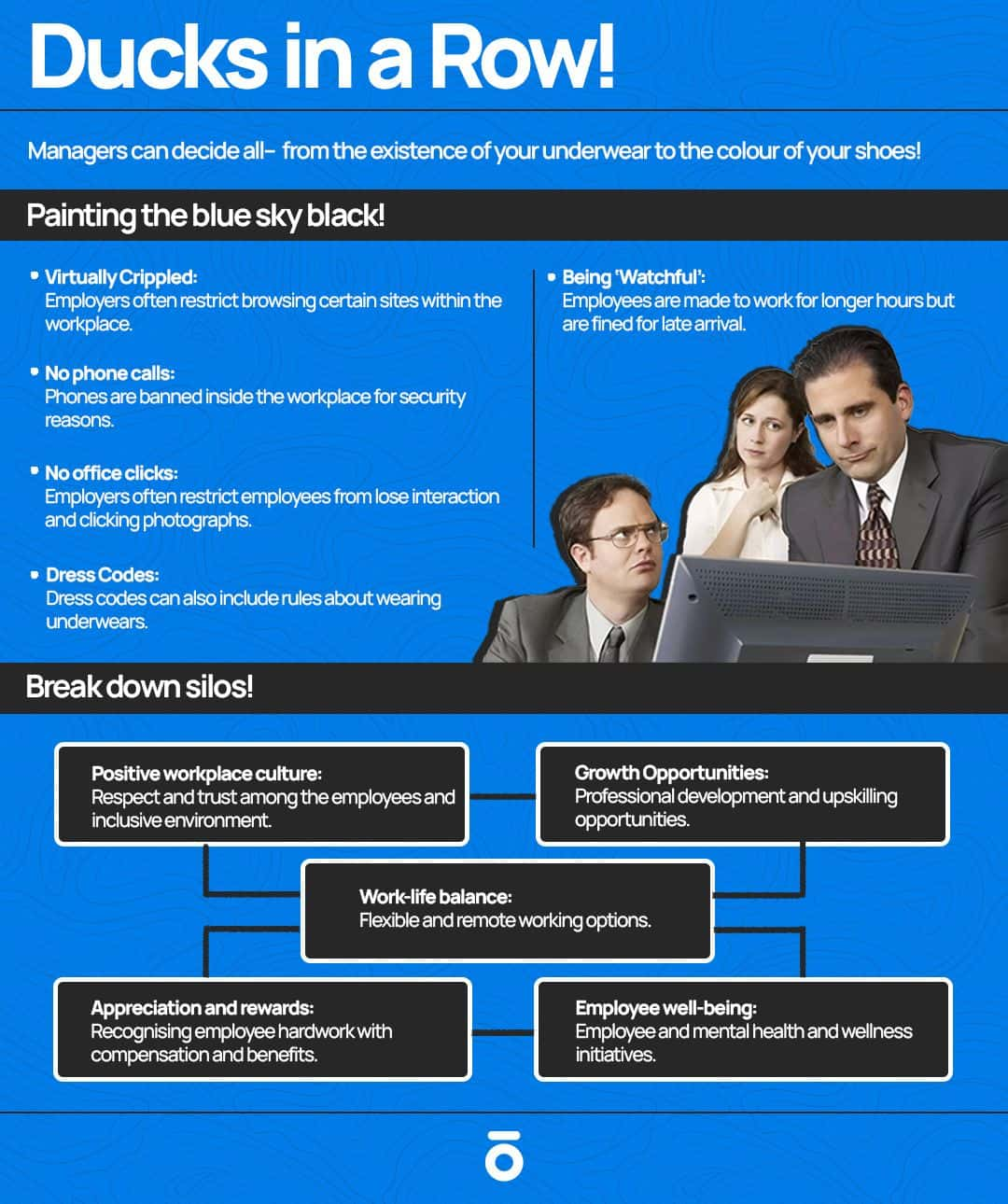7 Employee-Friendly Policies Every Workplace Must Have

Introduction
Change is the only constant, and sometimes, that's a good thing. Well, it took a global pandemic to finally change things, at least in the workplace. Work took a backseat while life regained its importance, FINALLY!
The mental burnout people experienced was unprecedented. Suddenly, people started prioritising their health and well-being more than pretentious deadlines. It was only a matter of time before employers also started to notice.
What are employee-friendly policies?
Now that the workforce is putting life before work, the entire landscape of employee-employer relationships is in the midst of a seismic shift. There's a growing trend amongst employers to implement more employee-friendly policies. Taking into account employee satisfaction has moved up the ladder of company outlooks.
Employee-friendly policy is the buzzword, or rather, buzzphrase, that has taken hold of the platforms. But what are employee-friendly policies? They are pretty straightforward: an employee-focused approach that helps the workforce feel recognised and valued for its contribution.

Why is it important?
It's a simple fact that we can focus better when our basic needs are met. If a workplace provides me with mental peace instead of stringent rules, it adds to my work satisfaction. If I am able to prioritise other aspects of my life when required, it helps me achieve a healthy work-life balance that, in turn, helps me focus better on work. This is equally beneficial for the employer as a happy workplace is always more efficient and productive. It just works, y'all.
By providing better employee-friendly policies, employers can reduce employee turnover(which saves the company hiring and training costs for new employees). It also saves you hours on LinkedIn disgruntledly trying to find your next best job!
A recent study demonstrates that Employee-Friendly Companies (EFCs) yield benefits such as improved employee health, increased commitment, job satisfaction, engagement, and reduced turnover intentions. These findings tell us that companies that invest in employee-friendly policies not only enhance employee well-being but also boost productivity and organisational performance.
What Are Some of the Examples of Employee-Friendly Workplace Policies?
Enough jabber about the perks of working in an EFC. "How do I know my company is an EFC?" I hear you ask! Fear not, fellow employees; I've noted down some pointers for you to judge what policies make your company employee-friendly.
Flexible Work Timings
Your alarm didn't go off. You overslept. There's insane traffic. Your dog hid your slip-ons. You are now late to the office. But instead of panicking, you know you can go into the office in peace. Your work timings are not rigid. A bit of tardiness is not demonised but accepted as an unavoidable reality of life.
Paternal Leave
You are a new parent. A father to twins. Your wife has six months of maternity leave and can stay home with the kids. You are miserably back at the office after just a few days. You're sad and deflated because you wanted to spend some quality time with your newborns and help out your wife in the early days of parenthood.
However, you received an email today. There has been some reform to the employee policy, and now you can take a paternity leave of up to 12 weeks. Do you identify as a happy father now? Wouldn't you feel lucky to be in such a company?
Remote Work
Your mother slipped and now needs assistance; you are going through a rough patch in your personal life, or heavens forbid, your pet just looked at you sadly when you left for work yesterday, sending you into a spiral. In short, there are times in life when travelling to work may feel like a herculean task. And quitting may even feel like the easier option. Hey, relax. It's life, not a simulation (At least until Elon manages to prove otherwise). It happens.
As long as your work gets done in time, it shouldn't matter where you do it. The advantages of remote work are immense. It breaks the monotonous cycle of daily commutes, lets employees recover from workplace burnouts, and helps them prioritise other aspects of their lives—all while improving productivity. A Stanford study has highlighted that remote workers are as much as 47% more productive than in-office employees.
Be as it may. What it also does is let the employee know that their employer trusts them. It helps their self-esteem and creates a bond of trust and loyalty that, in turn, pays off for the employer.
Inclusivity
We all want to feel included. Be a part of something. Irrespective of our race, religion, sexual preference, or language. As social animals, we thrive in a place where we are not subjugated to marginalisation.
Your pronouns are they/them. You have specifically talked about it with your colleagues. But your boss keeps referring to you as "she". You let it slide the first few times. You then corrected him once. Nothing changed. One day, you leave work and vow to never go back again.
It's one of those policies the workplace can enforce without spending a single dime. It simply needs to foster an environment where people of all backgrounds can feel at home and work together without judgment or prejudice. All it takes is a little awareness and a bit of effort.
Four-day work weeks
Earlier in 2023, CNN reported that Iceland's economy has been outperforming most of its European peers ever since adopting a shorter work week without any loss of pay. Not just Iceland but a lot of countries have started to adopt the four-day work week.
It not only promotes a better work-life balance but also helps to manage workplace burnout and aids employee satisfaction. Although India may not see a four-day workweek any time soon, it is still encouraging to see other countries setting precedence.
Mental Health Resources
The economy is unstable. Prices are sky-high. Owning a home feels like a fever dream. Jobs are ever-demanding. People are burnt out.
It's only natural to want to talk about it. However, mental health resources are not exactly cheap. Now, imagine a workplace that provides you with the understated benefit of mental health resources. It's not simply targeted at your mental well-being but also your (expenditure). It's simultaneously providing you relief without extracting a heavy toll in return.
Better Perks
The new generation prefers a holistic quality of life over simply trying to get ahead in the corporate world. For them, a company that doesn't mind if you work remotely sometimes has a PlayStation, a weekly sports day, or an inclusive place is more attractive than a company with stringent rules, despite better pay.
The idea is to make the workplace fun so that employees don't find themselves "stuck" in the office. Having perks such as health insurance and paid time off makes employees feel valued and looked after. Also, something as simple as "employee recognition" can go a long way.
As employees, we are always expected to do our best work. But sometimes, we push our limits. Go above and beyond. When a workplace notices that and acknowledges you for your effort, this validation works as fuel.

How Do We Implement Workplace Policies?
A good place to start would be to get out an employee engagement survey that helps you get input from your employees. It could be an anonymous survey so employees can voice their concerns without feeling restricted.
Apart from that, you could also take a look at your competitors and judge what benefits they currently offer so you have a competitive advantage. The primary ingredient to this change is the willingness on the part of the employers. And it is bona fide that an employer that looks after its employees often gets the best out of them without much effort.
Conclusion
Work can be fun. It can be inclusive. You don't have to choose between work or your personal commitments. A great workplace is one where you are free to do your best work without any external stressors. When you have significant employee-friendly policies at your disposal, you are satisfied, and as an employer, you have loyal employees who are willing to go the extra mile. When you have happy employees, you have happy customers.
It's simply good for business!


Why Recovery Days Are Important for Long-Term Health

Work-Life Balance: Tips for a Happier, Healthier Lifestyle

5-Minute Mindfulness for Busy Lives


